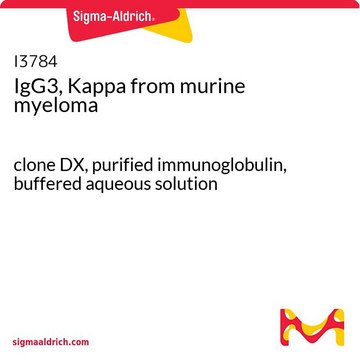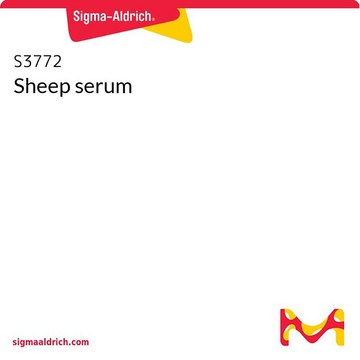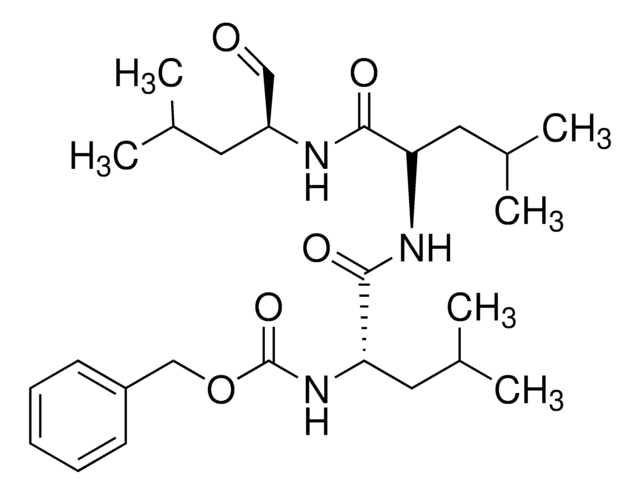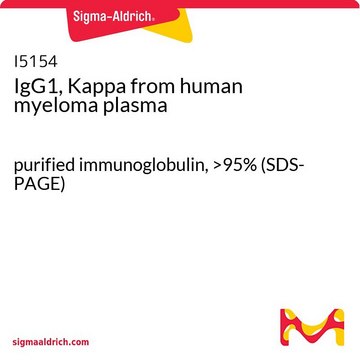Wszystkie zdjęcia(1)
Kluczowe dokumenty
M9019
IgG3, Lambda from murine myeloma
clone Y5606, purified immunoglobulin, buffered aqueous solution
Synonim(y):
Mouse IgG3-λ
Zaloguj sięWyświetlanie cen organizacyjnych i kontraktowych
About This Item
Polecane produkty
pochodzenie biologiczne
mouse
Poziom jakości
białko sprzężone
unconjugated
forma przeciwciała
purified immunoglobulin
klon
Y5606, monoclonal
Formularz
buffered aqueous solution
Warunki transportu
dry ice
temp. przechowywania
−20°C
docelowa modyfikacja potranslacyjna
unmodified
Szukasz podobnych produktów? Odwiedź Przewodnik dotyczący porównywania produktów
Opis ogólny
IgG (Immunoglobulin G) are the most common Immunoglobulin′s isotype in blood, lymph, cerebrospinal and peritoneal fluids and serve as key players in the humoral immune response. IgG include four subclasses (IgG1, IgG2, IgG3, and IgG4), consist of a variable Fab fragment (which includes the antibody recognition site) and a conserved Fc fragment.
Zastosowanie
IgG3, λ from murine myeloma is suitable as isotype control in immunohistochemistry of formalin-fixed, paraffin-embedded sections and in FACS.
IgG3, Lambda from murine myeloma antibody has been used in Fluorescent activated cell sorting (FACS).
Działania biochem./fizjol.
IgG antibody subtype is the most abundant of serum immunoglobulins of the immune system. It is secreted by B cells and is found in blood and extracellular fluids and provides protection from infections caused by bacteria, fungi and viruses. Maternal IgG is transferred to fetus through the placenta that is vital for immune defense of the neonate against infections.
Postać fizyczna
Solution in 0.02 M Tris buffered saline, pH 8.0, containing 0.02% sodium azide
Oświadczenie o zrzeczeniu się odpowiedzialności
Unless otherwise stated in our catalog or other company documentation accompanying the product(s), our products are intended for research use only and are not to be used for any other purpose, which includes but is not limited to, unauthorized commercial uses, in vitro diagnostic uses, ex vivo or in vivo therapeutic uses or any type of consumption or application to humans or animals.
Ta strona może zawierać tekst przetłumaczony maszynowo.
Kod klasy składowania
10 - Combustible liquids
Klasa zagrożenia wodnego (WGK)
nwg
Temperatura zapłonu (°F)
Not applicable
Temperatura zapłonu (°C)
Not applicable
Wybierz jedną z najnowszych wersji:
Masz już ten produkt?
Dokumenty związane z niedawno zakupionymi produktami zostały zamieszczone w Bibliotece dokumentów.
Nicholas R Forsyth et al.
Cloning and stem cells, 8(1), 16-23 (2006-03-31)
Human embryonic stem cells (hESC) have great potential in regenerative medicine, provided that culture systems are established that maintain genomic integrity. Here we describe a comparison of the effects of culture in either physiologic oxygen (2%) or room oxygen (21%)
Nurlaely Mida Rachmawati et al.
International immunology, 25(2), 117-128 (2012-10-19)
Stimulation of Toll-like receptor 4 (TLR4) induces not only innate but also adaptive immune responses, and has been suggested to exert adjuvant effects. Additional to such positive effects, pre-stimulation of TLR4 induces endotoxin tolerance where animals are unresponsive to subsequent
Tracy Goodpaster et al.
The journal of histochemistry and cytochemistry : official journal of the Histochemistry Society, 56(4), 347-358 (2007-12-12)
Fibroblasts are critical for tissue homeostasis, and their inappropriate proliferation and activation can result in common and debilitating conditions including fibrosis and cancer. We currently have a poor understanding of the mechanisms that control the growth and activation of fibroblasts
Systematic analysis of ATG13 domain requirements for autophagy induction
Wallot-Hieke N, et al.
Autophagy, 14(5), 743-763 (2018)
Gestur Vidarsson et al.
Frontiers in immunology, 5, 520-520 (2014-11-05)
Of the five immunoglobulin isotypes, immunoglobulin G (IgG) is most abundant in human serum. The four subclasses, IgG1, IgG2, IgG3, and IgG4, which are highly conserved, differ in their constant region, particularly in their hinges and upper CH2 domains. These
Nasz zespół naukowców ma doświadczenie we wszystkich obszarach badań, w tym w naukach przyrodniczych, materiałoznawstwie, syntezie chemicznej, chromatografii, analityce i wielu innych dziedzinach.
Skontaktuj się z zespołem ds. pomocy technicznej







